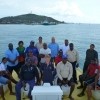Torres Strait training aims to improve marine safety
Australian Maritime College
Nov 21 2013

AMC is playing a key role in developing the seafaring skills of the Torres Strait Islander and Aboriginal people and helping to improve maritime safety in the region.
The college was invited to deliver a coxswain course as part of the Torres Strait Marine Safety Program, which is a partnership between the Australian Maritime Safety Authority, Maritime Safety Queensland, Torres Strait Regional Authority and Queensland Police.
The course will be conducted by AMC maritime trainers Paul Brown and Ruth Findlater. Ruth arrived on Thursday Island with four suitcases of luggage – one for herself and the rest packed with learning materials for the students.
A group of 15 students met at the training vessel last Monday, 18 November and spent the day familiarising themselves with their new accommodation before departing for the four-week training cruise.
AMC Vocational Education and Training Program Manager Jarrod Weaving said the program played a vital role in the economic development of the region.
“The aim of this course is to provide the Torres Strait Islander and Aboriginal people with the skills and confidence needed to run sustainable maritime and fisheries-related businesses,” he said.
“The students will learn about the safe operation and maintenance of vessels, including vessel handling, engineering, navigation and seamanship skills. After completing the training, they will be formally qualified with a nationally-recognised certificate and commercial licence.”
According to the Torres Strait Marine Safety Strategy, the region stretches 150 kilometres from the tip of Cape York Peninsula in North Queensland to the south-west coast of Papua New Guinea.
It includes 18 island communities and two mainland communities with a total population of 8306 people, of which 6168 are of Torres Strait Island and Aboriginal descent. The islands are scattered over a geographic area of 48,000 square kilometres.
Much of the activity in the Torres Strait is water based and it is considered a complex area to navigate safely. In addition to many reefs, islands and rocks, the waters are subject to significant tidal flows, strong winds and choppy seas.
Many residents of Torres Strait use traditional inhabitant boats (TIBs) to fish and dive commercially for crayfish and other species. They must hold a commercial license, the TIB Coxswains certificate, to undertake these activities.
